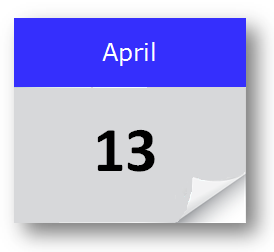The 13th of April is New Year’s Day in Cambodia and celebrated in a festival called Chaul Chnam Thmey The 13th of April is also the second day of the New Year’s celebration of Songkran or Pii Mai in the country of Laos. The 13th of April is the 103rd day of the year (Gregorian calendar) or 104th in a leap year.
On the 13th of April 1912
The Royal Flying Corps was created. A little over 2 years before the start of World War 1 the British Army created the Royal Air Corps as a recognisance division of the Army. Balloons had been used in wars before for recognisance of the enemy’s position but this was the first time the British army had employed planes for that use. Britain was a couple of years behind the French and German armies that had been using recognisance planes since 1910. The French were the first nation to see the benefit of using planes in the military combat. Many couldn’t see an advantage to planes over balloons or even the Calvary but the new military weapons of the day such a well prepared artillery battery made Calvary charges almost impossible. The Poem “charge of the light Brigade” talks of one such encounter with the British light Calvary almost obliterated as it was wrongly sent against a Russian artillery battery on the 25th of October 1854 during the Crimean War. The effectiveness of planes for military observation would be proven after the outbreak of World War I (on the 28th of July 1914). On the 22nd of October a British Captain and Lieutenant spotted the German army preparing to surround the British Expeditionary Force. Their report allowed the BEF to retreat and the possible saved the lives of the 100,000 soldiers. Initially Britain relied heavily on Frances air corps for recognisance but leading up to and during the First World War Britain began to catch up in its use of military aircraft. In fact when the Royal Flying Corpse became the Royal Air Force (RAF) on the 1st of April 1918 it became the worlds first independent Air Force with an Air Force equal to, and not sub ordinate to, the Army or Navy.
On the 13th of April 1849
The Kingdom of Hungary became a Republic. Following the Napoleonic wars, the economy of Hungary was severly weakened and in the Austrian Emperor, Joseph II, called the Diet (Hungary’s Parliament) to convene and discuss what could be done to improve the situation. The Nobles had the right to pay no tax yet the tax paying masses had no right to vote. Within the Diet a Liberal Party began to emerge which called for more rights for the common Hungarian. After Ottoman victories in Hungary in the sixteenth centaury, Hungary had two kings, one was of Hungarian-German origin and the other was Austrian and known as the Habsburg Monarchy. Despite this the country was to an extent autonomous, except for major reforms. The Habsburg Monarchs objected to any reforms proposed by the Liberals and many of the most outspoken of the party were arrested. On the 15th of March 1948 Revolution started in Hungary (the 15th of March is a national holiday in remembrance of this revolution) and demonstrations took place in both Buda and Pest (they were separate cities until 1873). The Imperial Governor accepted the demands of the protestors and soon many more demonstrations by revolutionaries and counter revolutionaries occurred. 1848 was the year for revolutions in Europe. Austria was dealing with one of its own while another broke out in France. The success of the revolutions in France and Austria increased the movement of the uprising in Hungary. Under the leadership of a young lawyer and journalist named Lajos Kossuth and with Austria busy with its own reforms, as well as the Habsburgs in hiding, the Governor General had no choice but to give in to the revolutionaries and he created a new government with democracy at its base. This new government demanded that taxes collected in Hungary by the Habsburgs should be spent on Hungary and that the Hungarian regiment of the Habsburg army should answer to them. By the 31st of October 1848 the Austrian army had re-taken Vienna and the Habsburgs returned to power, infused with confidence they vowed to regain control of their Empire. The Habsburgs chose a new Governor of Croatia (Croatia was governed by Hungary) who they knew was very loyal to the Austrian crown and was not sympathetic to the Hungarian uprising.
Count Josip Jelacic was their man and his first act was to deny any governance by the Hungarian Parliament and made alliances with the Serbs. Count Jelacic then led his troops to war with Hungary. On the 13th of April 1849 the Hungarian Government proclaimed itself a Republic, but this wasn’t to last. The Habsburgs called on Russia to help re-take Hungary and by August 1849 Hungary was once again firmly under Austrian control.
